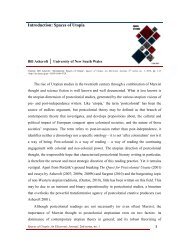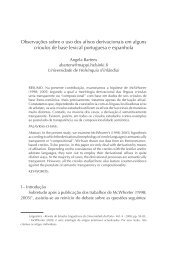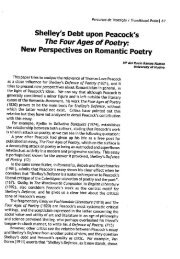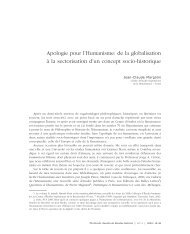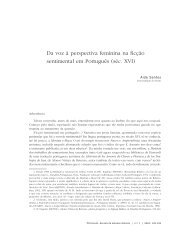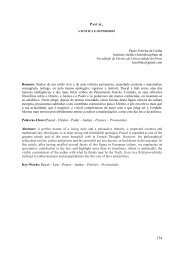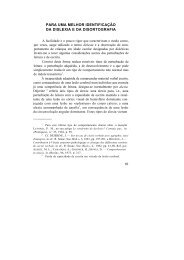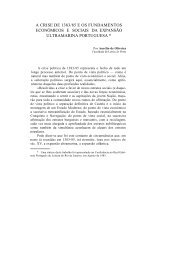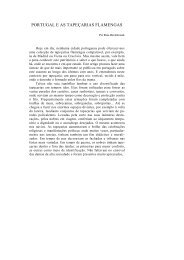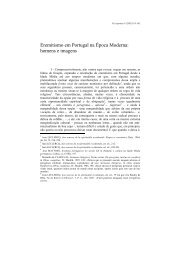Bilbo Baggins: An (Un)expected Hero
Bilbo Baggins: An (Un)expected Hero
Bilbo Baggins: An (Un)expected Hero
You also want an ePaper? Increase the reach of your titles
YUMPU automatically turns print PDFs into web optimized ePapers that Google loves.
This also happens for the reason that <strong>Bilbo</strong> doesn’t have heroic intrinsic<br />
qualities, he grows as a hero as he overcomes the dangers, and even when his<br />
“heroic qualities” are in the highest level, he always seems very unsure about it,<br />
what gets to be proved in the very ending of the story, when <strong>Bilbo</strong> returns to be<br />
a domestic Hobbit – his character proved to be “round”: originally he is<br />
domestic, then adventurous, then domestic again, what confirms that, even in a<br />
now different way, <strong>Bilbo</strong>’s more comfortable in being a quiet Hobbit, than a risky<br />
one.<br />
<strong>An</strong>other issue that clearly separates <strong>Bilbo</strong> <strong>Baggins</strong> from the classic<br />
hero’s concept is the fact that he “betrays” his group. By giving the Arkenstone<br />
to Bard, knowing that was one of the items the Dwarves wanted the most, <strong>Bilbo</strong><br />
is accused of treason, something that was unthinkable for the classic hero. But<br />
this “treason” is directly connected with other difference between <strong>Bilbo</strong> and the<br />
classic hero – the fact that he is fair, rather than greedy. In the classic epics, the<br />
most the characters had, the better, bigger and powerful they were; this way,<br />
they didn’t think on fairness, because to them fair was to the best, to have the<br />
most, they weren’t as much concerned with issues regarding with fairness or<br />
justice as they were with power or status. But <strong>Bilbo</strong> is not like this, and he gives<br />
the Arkenstone to Bard, because he believed that that was the right thing to do.<br />
But not only of differences is the connection between <strong>Bilbo</strong> <strong>Baggins</strong> and<br />
the classic hero made; in order to be considered a hero, the Hobbit certainly<br />
shares some features of the epic hero, characteristics those who become quite<br />
clearer after the moment in which <strong>Bilbo</strong> kills the Spider all by himself. If the<br />
<strong>Baggins</strong> side of <strong>Bilbo</strong>’s family made him fear the adventure, his Took side (his<br />
mother’s) impelled him to go into the quest, what can be seen in the temptation<br />
he feels to say “yes” to the quest, temptation that that he had to fight back,<br />
when he remembered the possibility of a dangerous journey. But is after killing<br />
the spider that the hero in <strong>Bilbo</strong> reveals himself; from this point on, <strong>Bilbo</strong>’s<br />
bravery gradually increases.<br />
<strong>An</strong>other feature that <strong>Bilbo</strong> shares with the classic hero is the fact that he<br />
is very astute. Both <strong>Bilbo</strong> and the classic hero are not especially intelligent,<br />
erudite, but they think fast enough to get out of the situations they are in; <strong>Bilbo</strong><br />
is clever enough to survive to Gollum’s game and to wait for the right moment to<br />
escape from the Elves, when they imprison the Dwarves (in a quite similar way<br />
to the Odyssey moment in which Ulysses escapes from the Polyphemus’ cave).<br />
Also to take into account is the fact that even though <strong>Bilbo</strong> didn’t want to have<br />
responsibilities in that group, he always performs his duties, and he is always<br />
able to get out of the situations he is involved in, no matter how hard they are,<br />
being this factor connected with the fact that <strong>Bilbo</strong> (just like the classic hero) is<br />
protected by his heroic fate, that is to say, <strong>Bilbo</strong> is destined to perform great<br />
duties, so luck and chance are always protecting him.<br />
As in the classic epic narrative, in The Hobbit or There and Back Again<br />
all the secondary characters are placed in a position of helping or disturbing<br />
<strong>Bilbo</strong>’s quest. It’s quite clear that despite the existence of some fluctuations,<br />
there are no in between characters, every one is either good or bad. This<br />
division becomes quite clear in the Battle of the Five Armies, where we can<br />
easily see who is on each side; but on a deeper analysis of the main characters<br />
of the book, we can see that on the helpers side (those who will assist <strong>Bilbo</strong> in<br />
his quest) are Bard, Beorn, the Dwarves, the Eagles, the Elves, Elrond,<br />
Gandalf, Men and Roac. On the other hand, we have characters who will try to<br />
45



